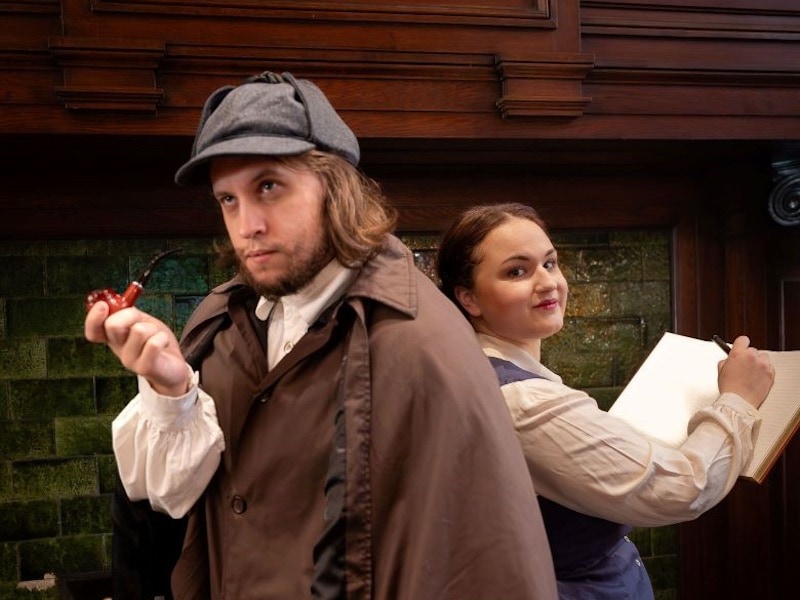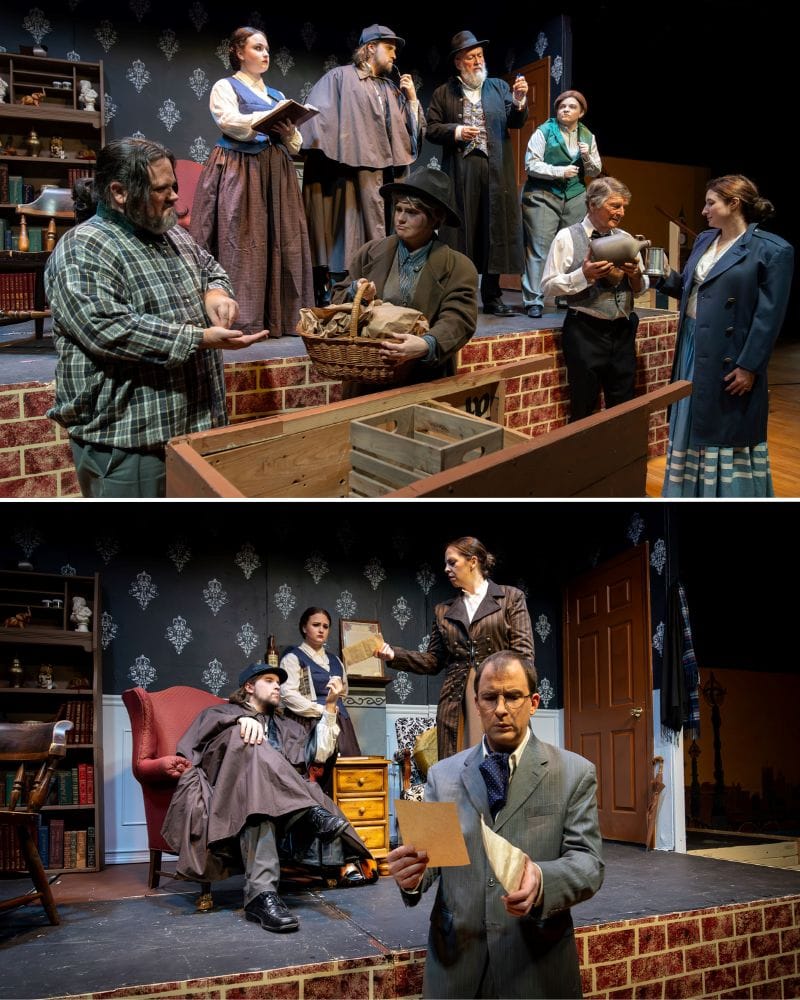For even the best of theater companies, the first step in mounting a good production is selecting a strong script, one that can play well theatrically. It’s possible that, in choosing The Adventures of Sherlock Holmes, Sterling Playmakers, which has done some excellent work in recent years — 2022’s Ragtime comes to mind — was influenced by the reputation of adaptor Jon Jory, who had a notable career in regional theater with the Guthrie Theater in Minneapolis and the Actors Theatre of Louisville.
Alas, Jory’s compilation of four Arthur Conan Doyle stories simply does not work as a theater piece. It provides only the thinnest of through lines among its independent episodes (they can be purchased from the copyright holder as separate one-acts). In adapting written work, making a credible transition from page to stage can be a difficult, subtle task. The tone of many of the show’s lines feels less like dialogue among characters than the lengthy recitation of expository material drawn closely from the original stories. The fault here is not that of the actors but of the lines with which they are burdened.

One example of this phenomenon is a marathon monologue explaining the background of a crime delivered by Jane (Cat Thompson) in the second episode. Another is a discourse about the solution to a crime in the third episode by Sterndale (Cathy Gurson). Both actors delivered their speeches capably, though their best efforts were insufficient to make the drawn-out, often static sequences theatrically interesting.
In her program note, director Courtney Garofolo praises the flexibility of Jory’s adaptation, in which any character can be played by anyone. The most important use of this flexibility was casting Lauren Sunday as Dr. Watson. Sunday serves well in her role as narrator in some portions of the script. As Dr. Watson, she is calm and unflappable, sometimes rather cheerful, and seldom parted from her notebook in which she quietly takes down witnesses’ statements and Holmes’ pearls of investigative wisdom. As such, her character differs little from the traditional male Watson.
In the Victorian era, a female Watson would have to have been a strong, going-against-the-current sort of woman to be a physician involved in criminal investigations. While far from a perfect parallel, the current Enola Holmes novels and movies do a nice job of introducing a vibrant woman into the Holmes universe. Making more of the fact that Holmes’ professional companion and chronicler was an independent woman in a male-dominated society could have added interest to the play.
As Holmes, Jeff Elmore is duly clever and logical, able to reconstruct “whodunit” from the seemingly most obscure of clues. He makes the character’s personality appropriately elusive. Like others in the cast, he successfully navigates a number of prolonged speeches, in his case as he explains how he has arrived at his impeccably accurate conclusions, though he falls into a histrionic moment at the end of the second episode.
Other over-the-top character bits pepper the production, such as the Little Man (Courtney Washington) and Breckenridge (Anthony Pohl) in the first episode and the Vicar (John McArthur) in the third. Oozing creepiness, Pohl as Mr. Rucastle is a fine villain in the final episode, though a Snidley Whiplash chortle as he exits seemed unnecessary. Clare Anderson is believable and effective as Violet, Rucastle’s frightened but resourceful governess.

The physical production is basic, the primary feature of the set (Garofolo, Kimberly Fry, and Michelina Polini) being Holmes’ sparsely furnished apartment placed on an upstage platform above the main playing surface. Other elements — free-standing door units, furniture groupings — were generally set by actors in costume in dim light, sometimes drawing focus from a scene elsewhere on stage. Lighting (Cecilia Hilliard) relied extensively on the use of follow spots (operator Charlie Gurson had a busy and successful night), with often abrupt blackouts between scenes. Among Judith Harmon’s costumes, Watson’s stood out for its attractiveness and neat lines, while Rucastle’s, padding and all, contributed nicely to his evil demeanor.
To the director’s and cast’s credit, there are numerous moments of well-timed humor, such as someone arriving at a door just after Holmes or another character had predicted they would. On the whole, however, the production was unable to compensate for the intrinsic flaws of its script.
Running Time: Two hours and 25 minutes, including one intermission.
The Adventures of Sherlock Holmes plays through November 19, 2023, presented by Sterling Playmakers performing at Seneca Ridge Middle School, 98 Seneca Ridge Drive, Sterling VA. Tickets ($18) are available online or at the door.
The Adventures of Sherlock Holmes
Book by Sir Arthur Conan Doyle
Adapted by Jon Jory
Produced by Kimberly Fry
Directed by Courtney Garofolo




